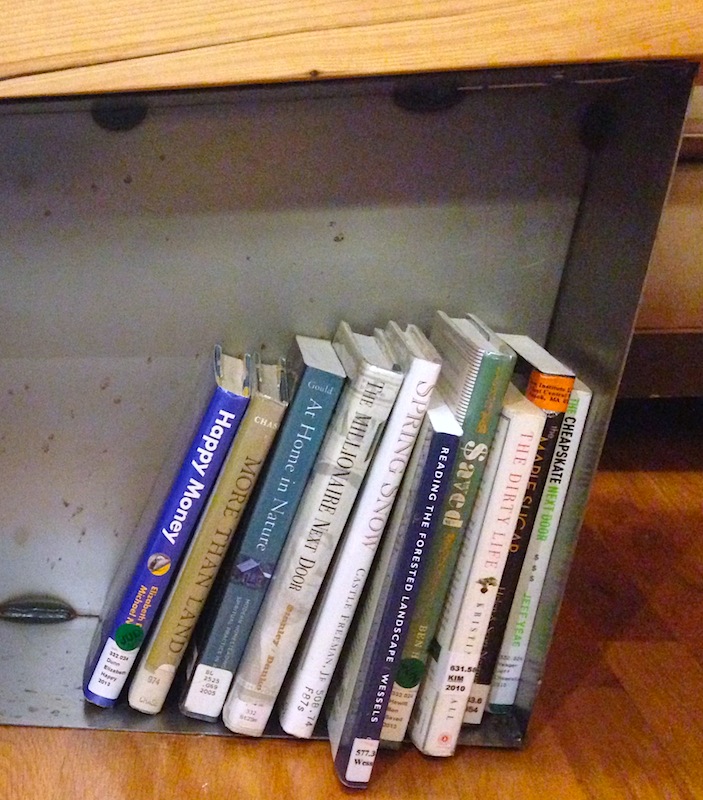If you graduated high school and are headed to college next month–congrats! Mr. Frugalwoods and I enjoyed that path just a few (ok more than a few… ) years ago and it truly is a magical time. Life is unfolding before your very eyes, you’re about to leave the nest, and the possibilities for your future are endless. But there’ll be time for all that poetic soul searching (not to mention toga parties) later. First, you’ve got to get through college with with your finances (and liver) intact.
It’s totally possible to snare yourself with lifelong debt during these four blissful collegiate years. But fear not, it’s also entirely possible to lessen the financial blow. I know that money isn’t exactly the most thrilling aspect of heading off to live on your own for the first time ever, but, fiscal responsibility doesn’t condemn you to an ascetic existence in the library. I promise. And hey, you might even meet another frugal weirdo along the way and later marry them, get a Frugal Hound, and write a blog about retiring early… not that I know anyone who did that…
Since Mr. Frugalwoods and I loved our college tenure so much, and emerged without any debt, we sat down to brainstorm our ultimate list of things to do for an awesome and frugal four years of undergrad. Not all of our advice is financial and it might not all resonate with you, but it’s what worked for us frugal weirdos. Many of the financial habits we developed during college still serve us to this day and we’re thankful for the frugal footing on which we began adulthood. If you’ve already graduated from college, check out our Frugal Advice For New College Graduates.
The Frugalwoods Guide To A Very Frugal (yet still awesome) College Experience
1) Choose an inexpensive school.
OK, I realize this proverbial horse may already be out of its proverbial barn, but I wouldn’t be a true frugal weirdo if I didn’t highlight the #1 way to avoid student loan debt. This is, in my humble frugal opinion, one of the best ways to set yourself up for a lifetime of freedom from debt. For many people, their debt originates with their student loans and builds from there. If you can avoid this genesis debt, you’ll be in great shape to avoid all other forms of debt too.
Mr. Frugalwoods and I went to an inexpensive state school with an excellent reputation and a ton of degree programs to choose from. Our annual tuition was so low that we were able to pay it in full every year with major assistance from our parents (thank you parents!), scholarships, and our on-campus jobs. We thus emerged with a whopping $0 in debt after our four-year stint. A fairly rare occurrence for our age cohort and one that we’re tremendously grateful for.
Paying attention to the sticker price of a degree is crucial. It’s pretty much the dead last thing a glossy college brochure and shining student rep are going to tell you about, but it’s by far the most important. The dirty secret of college is that you’re probably going to have a fabulous time and get a good education just about anywhere you go. Don’t get caught up in thinking there’s only one school (the expensive one) for you–in reality, there are probably a number of places that’ll cater to your interests of musical therapy, fencing, and gerbil-raising. Keep an open mind and consider in-state, inexpensive options.
2) Eat your meal plan.

If you purchase a meal plan, you best be eating that meal plan every single day. Food is an expense that’ll plague you for the rest of your life (doesn’t adulthood sound appealing?), so enjoy this hiatus from the real world of grocery shopping and cooking. Luxuriate in the fact that with a mere swipe of your card, you have a literal smorgasbord of food available to you three times a day. And, you’ve already paid for it!
So don’t let us catch you mincing around eating burritos from Chipotle because you forgot to take a sack lunch from the dining hall with you to class. No excuses, meal plan people!
3) Only pay for what you need.
Colleges are the champions of optional additional costs. You can buy the sports ticket package, the bonus meal plan package, the laundry package, the hire-a-freshman to text your parents package… it all sounds supremely tempting when you’re furiously filling out forms and money appears to be flying out of your hands at a rate previously thought untenable.
But don’t get caught up in the hype. Be realistic about what you’re actually going to use of your college’s services. Don’t buy the whole sports ticket package if you’re only going to go to basketball games and don’t join the climbing gym just because it “sounds cool, bro.” You’ll have plenty of chances to waste money throughout your life, don’t start now.
4) Textbooks should only come in used.

New textbooks are a worse investment than a new BMW. They depreciate so fast, it should be illegal. Avoid new textbooks like the scourge that they are. Never, ever buy a new textbook unless there’s simply no way around it. Buy used, buy used international versions (often cheaper!), share a book with a friend, check it out from the library and copy the pages you need… the alternatives are nearly endless here.
Also, resell those texts at the end of each semester. If you wait (as I so unwisely did in a few instances), it’s likely the course materials will change and the bookstore will no longer want your musty old tomes. People will say that you’ll keep these books for the rest of your life and refer to them later–but uh, in our experience, that’ll never happen. And if it turns out you do want them in 10 years, rest assured, they’ll be on Amazon for $3.
5) Do your own damn laundry.

I’ve heard rumor that you can pay someone to do your laundry on campus. To this I say, are you kidding me?! You’re not too busy to do your own laundry, I guarantee it. I graduated with a nearly 4.0 GPA, a roster of extra curriculars and leadership positions, not to mention an internship and a part-time job under my belt–and let me tell you what, I did my own freaking laundry all four years.
Folks, you can study while your clothes dry if you’re that concerned (although we found the laundry drinking game vastly more engaging… ). In addition to being a colossal waste of money, you’re circumventing a critical life skill. There’s nothing quite like your first load of laundry–you’ll ruin some stuff, but you’ll eventually figure it out.
6) Go to class because that fifth year of college is really expensive.
That about sums it up. You’re going to pay for a class whether you pass it or not, so do everything in your power to get what you’re paying for. Going to class is a surefire way to actually know what’s going on in a course, which, turns out, is rather useful when it comes time to take a test on what the class is about.
7) Go to the gym too.

Not quite as high-ranking as going to class, but a close second. If your college’s gym is free, go all the time. It’s an amazing resource and it’s probably the only time in your life you’ll be able to workout in a state-of the-art gym for free. Plus, it’s a valid stress reliever from doing all that laundry and selling back all those used textbooks. It’ll also set you on the path for lifelong fitness. And, it’s a great place to meet people.
8) Seek out the free food (because there’s always free food).
Mr. Frugalwoods and I became homing devices for free food on campus. If Tumblr existed back in the stone ages of our college days, we could’ve had one devoted entirely to when and where to snare free vittles. After the halcyon days of our meal plan were behind us, we discovered the fine art of dining on the college’s dime. Just about every club, interest group, student organization, and lecture offers some sort of culinary incentive.
We munched on everything from free tea and cookies to free three-course dinners. Turns out, you can go to any student group’s events or meetings and that’s exactly what we did. In addition to this being a savvy way to cut down on our food expenses, it gave us fantastic exposure to unique ideas, cultures, and disciplines. We learned about everything from traditional African foods to Indian dancing to the impact of styrofoam on our planet. Fascinating and tasty! Added bonus: these free food fests provided the settings for most of our dates, so we were getting the frugal triumvirate of date, food, and culture all in one!
9) Fake IDs are not worth it.

Drinking is expensive and doubly so if you get caught doing it underage. Despite what Blake down the hall promises about his cousin’s epic fake ID creation abilities, don’t risk it. In addition to the immense financial repercussions, you could end up with a record that’ll haunt you for decades.
While of course it’s wisest not to drink until you’re of legal age, there’s one surefire way to avoid getting caught: drink at home with friends. Cheaper, safer, and a lot more fun (not that I have any experience with this… ).
Mr. FW made me add this sentence: if you do go to a bar, make sure to pre-game. Drinks in bars are for maintaining the buzz, not attaining it. Since I know there are parents reading this, I’m not saying I advocate for this, I’m just outlining how to do it frugally.
10) Go to your professor’s office hours.
This ticks the boxes of both passing your classes and seeking out free food. Professors are usually delighted that someone bothered to show up to their office hours and they’ll often feed you some snacks and give you sage advice. Turns out, they’re smart and interesting people!
It’s also a wise idea to build relationships with faculty while you’re in school–it’ll be useful for letters of recommendation later on and, it enriches your coursework. Plus, you’ll be far more likely to ward off that dangerous year #5 victory lap.
11) Get a job.
After your freshman year (or maybe even during your second semester of freshman year), get a job on campus that’s either 1) very interesting, or 2) pays you to study.
Mr. Frugalwoods worked at our college’s art museum as a photographer. He and the head photographer carefully photographed and catalogued every item in the museum’s permanent collection in order to digitize the images for the internet. This fell under job category #1 and he loved the work.

I had a job as a writing tutor at the campus writing center, which still ranks as my most favorite job ever. I adored helping fellow students edit, revise, and enhance their writing and it was the most fulfilling thing I’ve ever been paid to do.
If #1 eludes you, don’t lose heart as the #2 option is just as good: get paid to study. Such coveted jobs include front desk manager at a dorm/library/rec center/student union or really any other position whose primary job requirement is that you sit behind a desk and answer banal questions for a requisite period of time.
While neither Mr. FW nor I banked a ton of dough from these jobs, they certainly helped us pay the rent and gave us solid working experience. We also both worked during our college summers–often more than one job at a time. One summer, I lived the thrilling life of working in the cash office of the Six Flags amusement park and another summer, I was employed by both the Olive Garden and a car dealership. Doesn’t get more exciting than that–try to contain your immense jealousy. I did get to eat free breadsticks at Olive Garden though, so you can actually be jealous of that.
12) Compare on and off-campus housing options.
Most schools require you to live on-campus your first year, which is a solid decision in my opinion. After that though, you’ll want to carefully analyze the cost benefit of living on-campus vs. off. Often, on-campus living is a lot more expensive than off. However, in exploring off-campus options, you’ll need to consider the separate expenses of things like internet, heat, electricity, and commuting, all of which are usually moot when you’re settled on-campus.
The house I shared with four friends my senior year was walking distance to campus and we had a ridiculously fun time living there together. It was a lot cheaper than the dorms and we enjoyed the freedom it provided for us to host parties study groups anytime we wanted. We even turned it into a revenue-generating operation by selling parking spots in our backyard during home football games. We even charged extra if game-goers wanted to use our bathroom. Props to my roommate J–he gets all the credit for coming up with that brilliant idea.
13) Take advantage of every single free offer for students.

When in doubt, try it out. You never know what’ll catch your fancy and you’ll never again have the opportunity to try so many different things (for free!) and meet so many different people. Go to every free movie/lecture/concert/pumpkin-decorating soiree that you can.
Mr. FW and I once won $50 each in a campus costume contest–not too shabby and Mr. FW totally forgave me for making him wear what amounted to a dress. In my defense, it was a Lord Of The Rings elf costume that I’d cobbled together from some draperies and although it was a little bit dress-like, it was apparently very convincing as an elf.
I also pointed out to him that he’d once worn a dress voluntarily when he dressed up as Janet Reno to attend a lecture by… yep, Janet Reno herself. I really did know he was the man for me from early on in our relationship. Takes a special kind of guy to (respectfully) imitate the former Attorney General in front of an entire auditorium.
14) Don’t watch TV and don’t go home every weekend.
Immerse yourself in the wild and wonderful world that is college. Mr. FW and I both knew people who left campus every weekend to go home and thus missed out on some of the richest aspects of being in school. The pep rallies, games, open mic nights, midnight spray foam fights, and random silly hat parties (because why not wear silly hats?!) constitute some of our favorite memories from our undergrad days. Don’t shortchange your experience by wasting time watching TV or retreating to your parents’ abode.
Our college friends, who are all both immensely creative and epically frugal, once hosted a Swiss Family Robinson themed treehouse Thanksgiving party where everyone both dressed up like the Swiss Family Robinson and brought a themed dish to share. Another time, we staged a full-on faux wedding complete with thrift store bridesmaid dresses, best man toasts, and a unity beer candle. One friend played keyboard, another officiated, someone else gave the “bride” away, and we arranged chairs in the lawn for the “guests.” Why did we do these things? Because why not! I seriously can’t make this stuff up, so rest assured, you’ll have similar opportunities during your own collegiate years if you open yourself up to them.
15) Don’t spend money on entertainment.
If you’re paying for a concert or movie, you’re doing it wrong. There’s a free one somewhere, I guarantee it. It might be your friend’s emo funk band playing in their neighbor’s basement, but it’ll be worth it for the humor alone.
I myself became a beer soda pong champion during my senior year, a prowess I intend to employ at some future date. Lifelong learning is an important skill to cultivate during college and I encourage you to explore all aspects of your personality. You just might uncover aptitudes you never knew you had.
I also played on an intramural softball team (the Dragons!) and was, without contest, the WPP (worst possible player). I was so bad that we decided I should stand in right field (FAR right field) and pray a ball never actually came my way. But my lack of ability with ball and bat didn’t matter a whit. My friends and I had fun running around in the dust together, wearing our matching homemade t-shirts.
16) Avoid car ownership if at all possible.

Cars are expensive little things and if you can make it through school without one, you’ll have just that much more money saved. You’ll always have a friend with a car and you can repay them for rides with beer by doing their laundry or cleaning their room.
Plus, in most college towns, you can get everywhere worth going on foot. Eschew Ubers and cabs too–just grab a group of friends and walk together. College is one of those times where you truly can save on transportation–take advantage of it and liberate yourself from the shackles of a vehicle!
17) Spend money on meaningful experiences.
You know how I said not to waste money on stupid things like new textbooks or laundry service or food when you already have a meal plan? That’s so you can use your money on things that truly are meaningful and that you’ll remember for the rest of your life.
This is college after all, and you should be OK with spending on the occasional special opportunity that you’re going to look back on and appreciate. I, for example, studied abroad and am so glad I did! Find those experiences that you really want to have and make them happen.
Final Thoughts
Enjoy every minute. I know, I know, I’m just an old lady delivering a misty-eyed remembrance of my idyllic four years on the quad. But seriously. People tell you it’s the best time of your life for a reason. You have minimal responsibilities, you’re surrounded by your friends 24/7, there’s a ton of free stuff to eat and/or do, and you’re living in a perfect balance between childhood and adulthood. Relish every moment, but don’t spend a ton of money doing so. Learn to cultivate a love for the frugal life now and you’ll set yourself up for a lifetime of financial well-being, peace, and freedom.
P.S. If you’re not a student, but happen to know a student, do them a solid and forward this along to add to their summer reading list.
What advice would you give to college students? If you are a student, what’s been most helpful to you while in school?








Great tips!! After a failed 3 week stint in the dorms on campus (It was so not for me), I ended up living at my parents’ house for most of my college experience and commuting to school. I was lucky that I chose a school only 25 minutes away ;). Although not for everyone, I enjoyed it and it was a great way to save money while I went to school. The bonus was that my parents are great cooks, so I always go to enjoy home cooked meals without any of the work….always a big plus for a busy college student!
That’s a wonderful way to save money! Nicely done!
Great tips!
Also, students, keep in mind that the least expensive school is not always the one with the lowest tuition. Factor in your financial aid– particularly grants and scholarships, i.e. free money, before determining which institution is right for you.
Yes this! If you are a smart cookie or a star athlete or your parents don’t make a lot of money, an expensive school with a big endowment can mean mondo financial aid. In fact, some of the elite ivies are completely free to kids whose parents make less than a certain dollar amount.
The elite SLAC I went to cost less out of pocket than my flagship state school would have because I got so much financial aid. Don’t keep from applying to expensive schools unless you already know that they’re not going to give you financial aid.
That’s a wonderful point–thank you both for sharing! I heard a story on NPR the other day about a student who was able to attend Georgetown for less than her in-state school thanks to scholarships and financial aid. It’s certainly wise to explore those avenues!
My son graduated from Columbia University and it cost us less to send him there than we would have spent sending him to the University of Maryland. He worked 10 hours a week at Columbia, which gave him work experience to start his career when he graduated.
This is one of my favorite FW posts yet!! It was a fun walk down memory lane – pre-gaming!, I forgot all about drinking 4 beers before leaving for the bar! – as well as a great list of truly useful tips. (I couldn’t drink 4 beers if I tried today, btw.)
Now, nearly, ahem, 20 years after graduating, I’m one of the grownups working on a college campus. I work in the career center, and I can attest that every, single event we hold for students includes free food. It’s usually (bad) pizza, but if employers and/or alumni will be there, it gets bumped up to fancy salads and sandwiches.
Hah, pre-gaming! Haven’t done that in a long time myself ;). There really is free food everywhere for students–it’s pretty amazing!
I definitely agree with checking the library before buying books. Our state has an inter-library system that allows a semester’s worth of renewal. Availability depends on your field and state, but I got a lot of my books this way. College really is a time when you set yourself up financially in many ways. Owning a car, taking out huge loans, choosing a major, and forming spending habits are all decisions that can have a significant impact when you graduate and start your career. This post contains great words of wisdom for college students!
Textbooks from the library are a great frugal score! And I agree, college is definitely when many of our lifelong financial habits are cemented. Best to get off on the right foot from the start.
For some courses I was able to rent the book from the library or they had the book on reserve. There were also a ton of free activities to do on campus.
For sure!
Those are great tips. I had a little debt after my university experience (what we call college and what we call university differs in Canada). I did 15 years of post secondary education (I was a bit of an addict I know!). I worked through all of it. I had free or really cheap furniture (a few pieces I still have). I had roommates or eventually my husband. I had a different experience after year 3 because I got married (yep, we were babies when we did that). My husband had an excellent job, so I had access to that $ as well. In the end, I came out with $14 000 in debt. Not perfect but since the education cost about $100 000 I think that was pretty good!
That’s a pretty low debt load for sure–nicely done! I’m impressed you did that many years of school for so cheap. Sounds like you had the frugal life on lock :)!
There’s also nothing wrong with having a job right out of the starting gate. I worked in the computer lab of the building housing my major from day 1 freshman year and it was the best thing I did. I had free printing, an “in” with the dean’s office, professors and staff engaged in my major. I knew everyone and everyone knew me. This was especially helpful when I botched my finals schedule one semester and the Dean’s assistant cheerfully offered to proctor every.single.final.exam that I missed in the scheduling snafu.
I agree! The issue with waiting until second semester is that there aren’t always that many openings mid-year. Along those lines, talk to professors, librarians, and staff in fields you are interested in and let them know you are looking for a job. They might have jobs they don’t advertise, or they might find a way to create a job for you (this happened to me).
If you worked a part-time job in high school (and I really hope you did!), working the first semester in college should not be a problem and I think it actually helps you manage your time better and distracts you from any homesickness.
Great advice, Walnut and Caitlin! Thanks for sharing 🙂
Excellent advice- I have not heard the phrase “pregame” in many years..,brings back memories!
After losing my scholarship due to
My inability to Buckley down and study hard for my science major, it was a huge wake- up call. I don’t have many regrets in my life, but not being a focused, serious student (separate from all the fun) is one if them. Fortunately college was much less expensive almost 30 years ago, however- hard lesson learned.
I did get my act together eventually and resumed academic vigor in professional school, however, so all was not lost.
People- STUDY!! Even if you are smart, and especially if you have a soul crushing major- the info doesn’t magically get locked in your head unless you are a genius ( which most of us aren’t)
So true–you’ve got to study!! I think the transition to college can be tough and it’s easy to lose sight of the academic side of things with so much going on.
It’s crazy to think about myself in college. I had no clue about money. My parents gave me a very strict “budget” which was a debit card with only small amounts of money. I didn’t think about saving at all. That $ amount was a goal. I spent it to under $1 every single month, mostly early too. Things finally started changing as I got older and had some side jobs too, but man, I was just jealous of everyone else who had awesome stuff.
On top of this, my parents paid for 4/5 (planned) years so I only had ~25k in student loans that I was able to pay off in about 2 years out of school. The one stipulation (other than graduating with good grades of course) was that I wasn’t allowed to have a credit card throughout then. It’s probably for the best. We use the cards responsibly now and look at them as any other account (thanks to YNAB).
Long story short, I wish I was more frugal during school but I was kind of forced to since my parents didn’t let me outspend my cash. And it was hard but it worked out for the best in the end.
Also, funny (and kind of terrible) but you can drink malt liquor instead of beer. A lot cheaper for a stronger punch! 😛
Oh malt liquor… it is cheap ;). That’s great you were able to pay off your debt so quickly–nicely done! And, the “budget” from your parents seems like a good idea. An early version of the real world, if you will.
Be an RA! I did a post a couple of years ago where I calculated the hourly rate (of both imputed costs and actual cash) I earned working as an RA in the dorms. It was over $30/hour, most of which were completely tax-free benefits. So the equivalent taxable wage would have been over $40/hour. And there aren’t many jobs a college student can get (well, except for jobs your parents probably wouldn’t want you doing) that pay that well!
+1 to being an RA. Especially if you are willing to avoid drinking in the dorms.
Great advice! So glad you both mentioned RA-ing! It definitely seems like the deal of the century for higher ed.
Oh my goodness, these are all fantastic tips! Since I graduated in 2012, I am still heavy-hearted with nostalgia when it comes to thinking about my undergraduate years. I think expanding off number 11 (Get a Job) would definitely be my advice. There are many opportunities right on campus that are two-fold: 1) will allow you to enhance your resume with experience and 2) help alleviate the costs of college. Think you don’t have time for a job? It’s a lot easier when you can leave a lecture hall, and right on down the road to your paid job on campus! I was able to land two internships that were actually paid simply because I would scrutinize every paper flyer that got pinned up around the quad. One was conducting market research through that College of Business, the other was through the athletic department – which actually paid me & provided me with free school spirit gear to wear! The other advice piece I would give is to connect & network like crazy (which goes hand-in-hand with 10 & 13 listed). It creates meaningful relationships that could have several lasting effects for your future. All of the free opportunities/experiences I engaged in (like emcee’ing for the Campus MovieFest finale, or volunteering for the Women’s Confidence Conference) provided me with wonderful people & skills that are still a part of my life to this day. This was a great post, I need to forward this on to all of the soon to be undergrads I know!
That’s fabulous advice, Alyssa! Thanks for sharing! I think getting a job is a tremendously valuable aspect of college–both for the money and the experience. My unpaid internship was totally worthwhile too for the experience side of things. And, great point about networking!
Definitely get a job and have a budget! I worked full-time all throughout college. It helped me in many aspects but I had no budget so instead I spent it on things I probably shouldn’t have been spending my money on.
Yes to budgets and jobs :)!
I have such mixed memories of college. It was fun, but it was also a lot of hard work.
While it is important to get a degree in something that you like, it is also really important to consider the future job prospects associated with your degree. Just because colleges offer degrees doesn’t mean that there will be a lot of good jobs out there related to that degree.
Great point. College is certainly not for everyone and, there’s no guarantee of a job afterwards, so it’s important to weigh your options.
After my freshman year I never bought a textbook. Many professors kept the books “on hold” at the library, meaning you could check them out for just a few hours. Few students took advantage so I always had the books to myself. If your professors don’t offer this service, ask!
Nice tactic! That’s great advice!
I think I have employed nearly every single one of these strategies in my undergrad career! I graduated with more money than I started with, and basically stopped asking my parents to pay my tuition after the first year when I knew I could swing it on my own.
It was shocking how some undergrads lived. It was as if Mommy and Daddy had a fire hose of cash with no way to shut off the gushing flow. Luxury dorms or apartments, new cars, buying but not using the premium meal plan when the kids go off campus to eat and drink fancy stuff, etc. Of course all those high spending students probably went broke soon after leaving college and having the Mommy Daddy Firehose of wealth shut off since they were accustomed to a high spending lifestyle.
That’s awesome you were able to pay your own tuition after the first year–I’m sure your parents were very grateful! And agreed, if your lifestyle is high-flying during college, what are you going to do afterwards? We pretty much started at the bottom and then didn’t inflate much from there ;).
Great tips. Used textbooks are great, even better, not buy textbooks at all if they’re not necessary. I never understand why people sign up for classes and not attend the classes.
So true. You’re got to go to class!
Great tips! I followed a lot of these myself (but not all of them, sadly). 🙂
I’m with you–I wish I’d followed my own advice more closely too ;)!
Fantastic list, and it’s nice to know that things haven’t changed much since the -ahem- late 80s/ early 90s.
My (expensive private school) campus (thank you ROTC) had no parking, so a car wasn’t an issue. Free movies on Friday.
You are spot on with the food and the housing. I tried to live off campus one year, but my roommie’s parents wouldn’t let her. Would have cut our costs by more than half, and we would have literally been two doors down from the campus apartment.
Alas, back then our campus gym was a single nautilus weight system and two bikes.
My jobs though were painting dorms and making pizza. The benefit of the pizza job was free food, so I could cut my meal plan a bit.
ROTC is another great avenue for saving money–thanks for mentioning that! And, making pizza sounds like a delicious but dangerous job ;).
They don’t call it the Freshman 15 for nothing…
This post made me so nostalgic for college. The friends that I made there are still some of my best friends today and I look back on those years very fondly.
If at all possible, try to convince a parent to get a job at a college or university where they offer discounts to the employees’ dependents. I ended up attending a local private university and paid only 10% of the tuition because my dad worked there. It ended up being less expensive than the state schools, even though I lived in the dorms my first two years. One of his coworkers had a son who did the same thing, and I met a pair of twins whose dad was a professor there so they only paid 5% of the tuition!
Great point about having a parent work at the school! That’s actually what I did for grad school–I worked full-time at the university and so my graduate tuition was completely free. It’s a fantastic route to take if you can swing it.
A tip to add is: Consider going to not just an inexpensive college, but a college in an inexpensive town. I went to an excellent and cheap state school, and even got a full ride (grateful for this every day since!), but said university is located in an extremely pricey urban area, and that’s what killed me. Despite never owing the school a dime, I still graduated with $10K in student loan debt (which paid some of my rent freshman year) and and $12K in credit card debt (basically three years of groceries). Granted, I wasn’t being as frugal as I could have been, but the cost of living in the area where you go to school makes a HUGE difference. My husband went to a state school in a tiny farm town, and he couldn’t have spent money if he tried…
That’s really good advice that I hadn’t thought of before, but you’re totally right! Mr. FW and I went to school in Kansas and, while we adored the town, it wasn’t an expensive place by any stretch. I can imagine that going to school in a place like Boston or NYC would have a whole other set of expenses aside from tuition.
Don’t forget that when you swipe into your cafeteria, everything is free for the taking. That means you can take as much as you want. See how many bagels, sandwiches and brownies will fit in your backpack. Buy the cheapest meal plan you can, swipe in, and take everything in sight. Pasta, eggs, cereal, salads, whatever. Go up for seconds and shove it all into plastic bags. Everyone knows college kids eat a lot, right?
Haha, YES! Can’t believe I forgot to mention how we’d take tupperware to the dining hall with us :)!
I think you nailed pretty much all the best tips. I remember there were tons of free/cheap movies and concerts on campus. I also got free tickets through clubs/organizations. I would also add that if you don’t have a car, buy in bulk when you do visit your parents. It’s a lot cheaper that way.
Buying in bulk for the win! And, free entertainment abounds on campuses!
Ohhh the memories….I blew way too much money by ignoring my meal plan. It was a partial meal plan that I didn’t use enough, but I was otherwise thrifty for my other meals. Having a car was expensive (parking and a few car accidents…) but also a blessing. My old high school job paid a ton more than the stuff I could find in a small college town, so I drove home every weekend and worked 12 hour shifts at my old job. (Another perk, they were super willing to let me work long hours on weekends when everyone else wanted off!) And the military paid for most of my education, which was a giant plus!
Sounds like you had a good system worked out with your old job! You were smart to hang on to that. And, great point about the military paying for school–that’s another wonderful option!
Look into the CLEP exam- College Level Exam Placement. It’s a long test (3 hours) usually given on a Saturday morning, and if you pass it, you get full credit for a class. It’s kind of like an AP exam. The CLEP is given for many introductory classes and costs about $75. If your college does not offer it, try the local community college and have the credits transferred.
Also, Royal gelatin is half the price of Jello if you are a Jello shot maker. Buy the sugar free versions as they dissolve much faster and the alcohol masks the artificial sweetener taste.
Good tips! I took a few community college classes during the summers and transferred the credits over–waaaay cheaper even than my cheap school. And, AP/CLEP credit is awesome too! Good to know about the Jello shot strategy 😉
Just one thing to add to #12–look into free housing! I was an RA for 2 years and in return for being “on call” once a month and organizing fun social programs for my 34 residents, I got completely free room and board AND made a bunch of amazing friends I’m still very close with 11 years later. The summer after college I house-sat for my favorite professor while his family was out of the country and got the run of a beautiful 3-bedroom housing for FREE for 3 months while I job hunted/bemoaned the fact that I was no longer in college.
Fabulous tactics! Being an RA is a really good idea. Thanks for sharing!
I teach at a community college and offer the following tips in terms of textbooks. First, as others have mentioned, find out if the instructor has copies of the text on hold in the library. Second, discover whether or not you can rent textbooks, either from your bookstore or through on-line retailers. Texts are often offered in electronic and hard copies and typically the electronic copy is less expensive. Third, you might be able to puchase the text used from a site such as Amazon or Half.com. If you choose to go this route, confirm ahead of time if you need to purhcase the digital access codes. Fourth, seek out OERs (Open Educational Resources). For classes that use anthologies such as a literature class, this is a way to access the material for free.
Nice! Thank you for sharing these resources, Christy. There are so many ways to circumvent the sticker price of textbooks!
One thing I would recommend is to start off at a community college and live at home, especially if you’re not sure what you want to do. Then transfer to another school to get your bachelor’s degree. You’ll save money and get the (sometimes boring) core classes out of the way, and technically you end up with two degrees. My state also instituted a really easy way to transfer credits from community colleges to state schools a few years ago, which makes it even better. If not and iif it’s feasible, live at home and go to a local college. It sounds bad but better to live at home during college than have to move home after because you can’t afford your student loan payments otherwise…
I also very much second going to as many free events as possible. There are so many amazing opportunities on college campuses. You’ll never again have the time or freedom to go to these.
Starting out at community college is a great frugal tactic! Also, taking classes during the summers at community college is another good way to take advantage of cheaper credit hours. I did that a few times and was glad for the cheap price!
I often cannot believe how different US schooling is to the one I had.
My university tuition was free, as it is for all Scottish students studying in Scotland. I am so grateful for that.
My uni didn’t have all of those ‘packages’ you mentioned in point 3 and I’m pretty sure the halls didn’t have a meal plan. I lived with my parents and commuted over and hour each way to get to my uni, something I would NOT recommend and it has put me off commuting for life, in order to save money. My travel costs were reimbursed by the awards agency (they no longer do this apparently) and I used the travel time to do some reading and note taking.
I maxed out my student loans, put them in a savings account and lived off grants and earnings, while still paying my parents for my living costs. I still earn more money on those loans than the interest I am charged so I pay back the minimum. Student loans here don’t affect credit scores or mortgages or other loans. I’m probably one of the few to have left school with more money than starting due to the unique way the system worked at the time.
Though I’m probably also the reason the system is no longer so generous…
That’s wonderful your tuition was free! Sadly, that’s certainly not the case here in the US, and tuition prices keep rising :(. I can totally understand why you’re off commuting for life—I think I would be too! But, like you said, it’s a great way to save money.
I spent a lot of money in college going home on weekends to visit with my boyfriend at the time. Fortunately I worked during school, so I could afford it, but looking back it was such a waste, especially because we broke up right after I graduated. Something I definitely miss from college is the free gym. It was such a great resource and SO conveniently located!
Oh yes, I miss that free gym too! I’m glad we used it a lot because I didn’t fully appreciate how awesome it was until I was in the “real” world ;).
These are great tips! I would also add that taking more classes is better. Usually as a full time student, you can take as many classes as you want without paying extra. I did my MBA part time, and I had to pay for each and every credit. It really made me appreciate the ability to take as many classes as I wanted while in college. You also may be able to waive certain credits in grad school if you’ve already taken them in college, which is potentially another huge money (and time!) saver.
We did have to pay by the credit hour for undergrad, but, it was certainly wise to take a lot each semester in order not to prolong the 4 years! Great point on waiving credits for grad school–definitely a money saver!
Wonderful tips! I wish I had had someone to explain lifelong debt to me before I chose a college. I was super frugal while I was there: not paying for entertainment, working a part time job, and spending $20/month on groceries once I went off the meal plan.
However, I passed up an opportunity to go to a great state school with a full scholarship: tuition, room, board, books, everything, PLUS $7000 CASH per year. Yes, I passed that up. Instead I went to an out of state private school. Even with all my scholarships there, I still ended up graduating with close to $25,000 in debt. It just boggles my mind that I did this. I knew that my parents would have $0 to help me out, so it was all on me, and I was intending to go into social work all along i.e. don’t need a fancy degree, and won’t get a high paying job to pay it off. Ugh. I’m super close to paying it off now, but I know my life could have been so much different if I hadn’t started out with all that debt.
I think it’s almost criminal we force 18-year-olds to make these decision that’ll impact them for the rest of their lives. It’s just so hard to know what you want to do when you’re that young! Not to mention that money and debt just aren’t quite “real” concepts to most of us at that age–I certainly only had a vague notion at the time. Kudos to you for having it almost all paid off–that’s awesome!
Excellent tips! After I got my acceptances and narrowed down my options to two top choices, I picked the one that was way more economical, and I’m so happy I did. Then I was able to take out loans for law school without feeling as overwhelmed (though they’re still a LOT.)
Regarding meal plans, I would also add a tip. At the school I attended, everyone (even people living off campus) was required to purchase a meal plan. It was a very small school, and that was the only way they could guarantee enough money to be able to contract with a provider. People often found themselves with more money on their account than they could spend (ours was a dollar-amount declining balance, where you paid for each item, not a plan with a set number of meals.) Luckily, there was a small convenience-type store that sold a lot of food and household supplies, where you could pay with your meal card money. A great way to use up money that otherwise you would lose at the end of the semester. AND the school allowed people to transfer money to other people’s accounts. On more than one occasion, I sold my money at a discount to someone who had run out. It was win-win; I recouped some cash and the other person got more bang for her buck.
Nice strategy with the meal plan money! Definitely worth using it all up (or selling it off). And, kudos to you for choosing the cheaper school!
You could probably do an entire post on the dangers of credit card debt in college, and frugally avoiding the lures credit card companies use to entice college students.
That’s a great idea, Judy! Thank you for the suggestion!
It’s worthwhile to look around very carefully for any kind of scholarships or bursaries. Unions offer them to children of their members. Many alumni offer them through the University financial aid department for odd and wonderful things, for being from a particular town or county, for writing an essay or making a piece of art, belonging to the NAACP, or being descended from a revolutionary.. Some just need an application, and if you are the only applicant…
Like applying for university, it is worthwhile to start looking into these things a year before you plan to start the University. A $10,000 scholarship might make one University look a lot nicer than another.
Also, if you have a second citizenship, universities in that country might be free or at least cheaper than in the heart of capitalism.
Once you are studying, there often are a variety of prizes and awards you can win as well. Some come automatically, but some you have to apply for. Professors often have grants that they can spend hiring people to help them. So tell your teachers of your special skills and desire to learn.
That’s great advice! There are certainly many more scholarships out there than just the ones offered by universities. It pays to look around! Both Mr. FW and I had random scholarships from various different organizations that we were able to cobble together. And, schools abroad can definitely be cheaper–certainly worth exploring!
Definitely look for scholarships all through school! I found lots of my fellow students didn’t bother to look once they were in university. I would go to financial aid each term and ask what new scholarships they’d heard about. My favorite was a scholarship from the data company that did our registration, grade, and transcript system (datatel). You can only get the scholarship from a school that uses their services, and they give 1-2 out per school each year. If you’re the only one who applies, free money! I used that to pay for a research trip to Costa Rica my senior year.
Also, don’t underestimate private schools. A lot of them have really good financial aid. It does not hurt to apply to a range of schools, both in-state and private, to see who gives you the best package.
In my university days, I was an advisor in the computer center, wrote programs for a professor, sold leftover 16mm film stock (from local productions) to students, shelved library books, and more. Dell started his computer company by building computers for students in his dorm room. Do you have skills others will pay you for? Do you see any unsatisfied “needs”?
And do not forget, if you want any free furniture, check your local streets at semester end.
Totally! All good points to keep in mind!
Great tips. It’s been too many years since I’ve been in college. 🙁 These are some of the things I’m talking to my children about. Making sure the are making meaningful choice about college. Understanding what their degree and career path will look like, earning potential, etc. all important things to consider.
That’s wonderful you’re helping guide your kids through these decisions. Selecting a college is such a daunting experience!
I had a job at a local pub as a bartender and cocktail waitress. It was a blast because many of my friends would come in and sometimes I would average $50 per hour in tips. Making $500 every weekend while also not spending my money on drinking was a major money maker/saver for me. And, I know what you mean about tutoring. I tutor now and I LOVE it! Very rewarding.
Sounds like the perfect job!
Excellent tips! I should share this with my students (except for the beer tips . . . ). A lot of what I tell them is contained in here.
Re: living on/off campus, do the math for what you’ll spend for the year. I never wanted to live at school during the summer. I ended up doing so one summer as a research assistant, and that job gave me a free dorm room if I wanted (but would not have paid my rent). Since I didn’t want to stay (that one summer was so boring outside of my job), I didn’t want to rent a place off campus with a 12 month lease, and there were not shorter leases available. When I did the math on 12 months of lease versus 9 months on campus, the on campus options were only marginally more expensive. I figured it was worth it to not have to worry about various bills, driving, or parking. Living close enough to walk was pretty expensive at my tiny school. Always pays to add up the numbers.
It does sometimes pay to spend a little on school opportunities too. We had a subsidized outdoor recreation center. It was pretty cheap for rock climbing, kayaking, backpacking etc experiences. I paid a fraction of what one might normally pay (say, $30 for a white water rafting weekend). While this wasn’t free, I still think it was worthwhile. And I still graduated with zero debt 🙂
Great point on the on vs. off campus costs–it’s definitely wise to run the numbers and look at specifics. And, I completely agree with spending on meaningful experiences!
Unfortunately, the city where I went to college was utterly un-walkable, so I had a car. It was a high school graduation gift from my parents, though, which I am still driving 10 years later! Plus, I made one of my best friends by being able to offer her rides. She did not have a car, and we visited churches together first semester of freshman year. 4 years later she was a bridesmaid in my wedding. 🙂
I’ll be honest, I was not frugal in college, but I graduated without debt thanks to a scholarship and incredible support from my parents.
That’s awesome you’re still driving the same car–nice :)! And, how great that you met your BFF through it. Graduating without debt is so key–it’s a wonderful way to kick off adulthood for sure.
Totally agree with all this, especially number 15. My mum and dad met at a free poetry reading. She was there because it was her landlady’s son writing the poetry, he was there because he was new in town and hoped to meet some like-minded folks. Turns out there weren’t many poetry lovers there ‘cos the poetry was TERRIBLE, but he and my mum bonded over trying not to laugh. So go to free things! You never know!
How perfect! What a great story :)!
Such a great collection of tips!
I would like to add:
– consider going to a country where higher education is free or veeeery cheap. International students can often obtain a nice stipend and are provided with accomodation ;
– adademic travel is another way of travel hack, IMHO. I’m not sure if it is applicable for USA but both universities I attended (two different countries in Eastern Europe) had travel grants for students. If your research paper was accepted for a conference/workshop, you could apply for a grant big enough to cover expences for an airway ticket and hotel/hostel + conference fee. Also, I would recommend asking conference commitee whether they provide travel grants for some student categories: such grants are often given based on field of research or on student’s citizenship.
Great suggestions, Arida! Thank you for sharing :)!
An additional option that may be available is taking college courses that are available to HS students. Usually the college has a trendy, fun name and you must be above a certain GPA in HS. They gain HS and college credit at the same time and if done responsibly, they could enter college as a sophomore or junior. (This was rolled out after I graduated from HS a long time ago at our local community college). In my new city, this is available and I read a news story where a young person graduated HS and already had an Associate’s degree. Even taking a few classes of those pre-reqs can add up to savings. I was lucky enough to take AP courses (HS) and summer community college courses and bypassed 15 credits of required classes.
Fabulous suggestions! Mr. FW and I were able to take some AP courses in high school that counted as college credit and it was definitely a great way to knock out a few prerequisites.
Great post! Especially with so many college grads struggling with debt. My husband and I saved a lot of money by living at home and going to our community college to get our A.A degrees.(Full scholarship for me-many local colleges offer these) We got married, he was accepted to WWU and we were able to save by staying off campus and he qualified for a Pell Grant (my hubby says make as little as possible the year before you apply) that paid for all his classes and tuition. I worked FT, he worked PT. (He worked at a video store so we were set with entertainment) We stayed all year, so when seasonal students left we scored all the stuff left by the dumpster. My husband was able to walk or ride his bike to both school and work. There were a lot of free parks nearby mountains and lakes that were absolutely beautiful. I don’t remember scoring much free food, but I did clip coupons, organize sales ads and go to the farmers market. We ate a lot of potatoes, rice and Top Ramen. We learned about local shops and their ‘happy hour’ and enjoyed some huge burritos we could share at Casa Que Pasa. 🙂
Sounds like you had a great system worked out–nicely done!
Once Mom explained about sorting laundry (I was 15) I made sure that all my clothes could be washed in the same load. I spent my graduation presents on 30 pair of cotton underpants. Each month I ran a load through the washer early in the am and spread the damp results around my room. Because paying for evaporation didn’t make financial sense. I strung one line between nails above the door and window trim. I removed them before vacating.
Carless in grad school, I’d offer to grocery shop for people who’d loan me their cars. For a couple bucks, I’d let others ride along to do their shopping. The cafeteria was so expensive that five of us formed a dinner coop. At the end of first semester, the others offered to pay me $25/wk/person to shop and supervise their cooking. Food for the five of us only cost me $30/wk. I used the extra to rent an apt with a full kitchen (and not much else). One guy at the market saved me his discards every day for a couple dollars. The other women showed up to help prep the last half hour before dinner. Great friendships, and we didn’t plump up in the cafeteria.
Wow–what great strategies! I love the idea of grocery shopping for other people–that’s such a smart endeavor. And your dinner coop sounds downright brilliant. Thanks for sharing!
Except for going in on a bottle of Mateus my senior year, I didn’t drink anything but water while I was in college. (I’m someone who doesn’t need alcohol to be disinhibited.) A few months ago I went to a liquor store seeking ingredients to make margaritas at home. I noted that we’ve saved a boatload over the decades by not drinking.
You’ve definitely saved a ton over the years by not drinking! Nicely done!
Just curious as to how you obtained scholarships? I’m sure you were an above average/excellent high school student. Do you contribute you and your husband’s scholarships to high school grades, SAT scores, or extracurricular or just a combination? My children are in elementary school, but I have heard from parents of high school students that if you are not a minority and are middle class, then it is very difficult to earn scholarships even for A students. Love your blog and you two really are excellent role models for the younger generations. Heck, even for the older ones too.
I went to the University of Kansas and my major was Elementary Education. I worked at the on-campus child development center (they hate to be called daycare). They worked so great around my schedule. I could come in and work a couple hours during nap time, where I got paid to study!!! AND – I always got a free lunch and snacks! Plus – one year our main cook broke her arm so I offered to come in early and help. This was great experience! A. it showed that I was willing to help out as a team player, which my boss made sure to point out in references for me. And B. I got to take home the leftovers!!!!!!!!!!!!!
Most of the kids at our center were children of professors. So I was able to get to know my professors on a more personal level (it’s hard to fail a student who you are going to see later that day when you go to pick up your kiddo – it’s not impossible, but it’s hard…). Lastly – I was able to pick up a LOT of side gigs babysitting. Professors take a lot of nights out with their spouses. They were ecstatic to have someone who they trusted and their kids already knew to come over and watch them. I even had a professor so desperate for a babysitter one night that he pushed back the deadline for a paper I had due if I would come watch his kids.
I would recommend this gig to any college student who likes kids!!
PS: Go Jayhawks!!!
Having successfully avoided college for almost 45 years, I have recently decided to follow the examples of my parents, my husband and 5 of our 6 children and get a college education. One reason is because I can basically go for free in our state, as can any adult who does not already have a degree. There is also a small extra grant available for those who are now being called “non-traditional students,” meaning anyone over 24 who is just starting (or returning to) college. (When my husband went back to college to finish his degree at the age of 40, they were calling them “returning students.”)
I told our two youngest kids, both of whom are in college and living at home, that I was doing it so I could have the pleasure of complaining in front of them about how much homework I have. Am hoping the look on youngest son’s face upon hearing this meant that his conscience was bothering him, but it might have just been his usual “Mom is nuts” expression. Really, though, I am at least partly doing it because tuition is free, there are a number of financial perks – I notice you bring many of these up in the above post – and I’m hoping to get something out of the experience that will help me be a better and more organized person.
I’m currently about halfway through “Meet the Frugalwoods” (I thought I knew how to be frugal until I read about the cardboard furniture in your NYC apartment) and this evening I decided to check out your blog. Very interesting! I was especially intrigued by your use of the term “hedonic adaptation,” of which I had never heard before. I had to go look it up! It’s a concept I have noticed, and resisted, but I didn’t know that there was a term for it.
Thanks Frugalwoods for such valid points. I’ll add that it’s important to move with like minded people in college as it would help one alot. plus peer pressure is one of the undoing of college students
I don’t suppose you were back in Kansas in the last couple of weeks? Ha ha probably not but I think I saw your twin sister!
I hit submit before I added this: Dual Enrollment is a hidden gem. My kids will both have their AA degrees (and so, all gen-ed requirements) done before they graduate high school as will a bunch of their friends. Dual Enrollment is really underrated. It allows you to get all of your general stuff and some of your prerequisites done FOR FREE. I think it’s always been a thing, but now it’s a much bigger thing.
Also, CLEP is your friend, and even better, it’s FREE. Modernstates.org offers virtual courses that give you a free voucher for a CLEP exam and free online proctoring of said exam. In our state, you can transfer in up to 45 credits, so you can bet my kids CLEP their hearts out. One of them is nearly at the 45 credit limit…the 9th grader already has 15 credits thanks to CLEP and is Dual Enrolled already. The best part about CLEP? Other than 2 of the exams, the scores are instant. No waiting until July to see if you passed that AP…you hit submit, and boom. There’s your score. Check with your intended school (or your DE school) to see which CLEPS they give credit for before deciding which ones to take. Also, factor in any APs your student may be taking as those come off the total # of transfer credits allowed.
I’m pretty sure that the popularity/availability of Dual Enrollment has expanded since you made this post. I’m positive that Modernstates didn’t exist then. These are MAJOR money-saving hacks for college. It’s even better if you know that you are headed in a specific direction. My 12th grader is graduating with her AA and nearly all of her STEM/engineering prereqs. It’s even better if your state has a scholarship program for the in-state universities. She already has the 100% Bright Futures scholarship requirements met. It’s best to familiarize yourself with these early so you can make sure that your student hits all of the requirements by graduation.
Lastly, do not underestimate the importance of your SAT/ACT score. It sounds so ridiculous that so much rides on a test, but it does. It pays to study early and often for these (we use Khan Academy for free and Uworld as a paid subscription). Start early enough and you might qualify for National Merit via 11th Grade PSAT. Even if you don’t, a standout score will 1) likely help to qualify you for any in-state tuition scholarship your state may offer and 2) cause said same universities to offer you renewable scholarships to choose their school. My daughter’s boyfriend gets a nice refund from the university every semester this way (yes, they pay HIM. Totally attainable). Apply for every scholarship. Your school probably has a scholarship portal. Use it. Make sure to pay attention to deadlines/requirements. Scholarships don’t just happen at one time of year, so look continuously. Look everywhere. If you’re in a real honor society like Phi Theta Kappa or a major-specific one, watch their website for scholarship opportunities too, and apply for them. Times have changed even in such a short number of years since this post was written, and there are now some incredibly frugal college hacks that are SO worth it!!